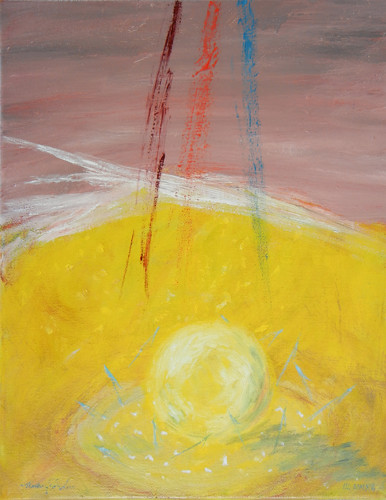Legion of Honor Museum in San Francisco is presenting a major survey of Austrian painter Gustav Klimt,
Klimt & Rodin: An Artistic Encounter (October 14, 2017 – January 28, 2018), which focuses on a selection of Klimt's paintings in his most celebrated intricate and elaborate style (closely associated with Vienna Secession), and more works in the styles more subdued and subtle, and not immediately reminding viewers of him, along with several sensual and impactful works by his contemporary, the French sculptor Auguste Rodin.
According to the program notes, Rodin and Klimt met in 1902, "while Klimt, the president of the Vienna Secession, was still
developing his signature style, Rodin was at the peak of his
international fame."
"Approximately
25 sculptures and works on paper by Rodin from the Museums' collection
provide visual dialogues with the works by Klimt. The exhibition is
thematically arranged around the Vienna Secession, Rodin's 1901
exhibition in Vienna, Rodin’s 1902 visit to Vienna, Klimt's landscapes
and Rodin's surfaces, and the depiction of women—for both artists an
eternal source of inspiration—exploring shared touch points and
developments in the two artists' practices throughout."
To me, the connection between these two giants was not obvious, therefore, I will report their works separately. First Gustav Klimt.
One of the most eye-catching pieces on display was a replica of a portion of the Beethoven Frieze, which was painted for the 14th Vienna Secessionist
exhibition, and is now on permanent display in the Vienna
Secession hall, and it was an important signpost for a new style, and a new epoch.
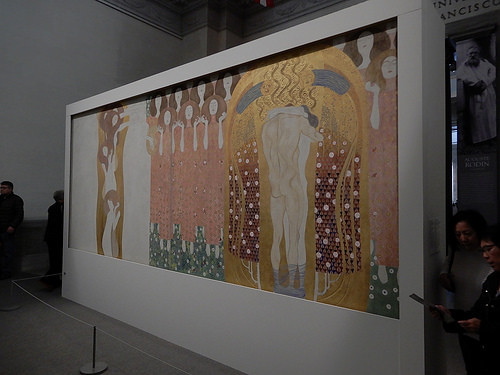 Beethoven Frieze (reproduction), 1902
Beethoven Frieze (reproduction), 1902
Next were several ornate and disturbing works, centering on
Nuda Veritas, which features a poem by Schiller. Noteworthy was a Secession Exhibition poster — superficially beautiful; innately profound.
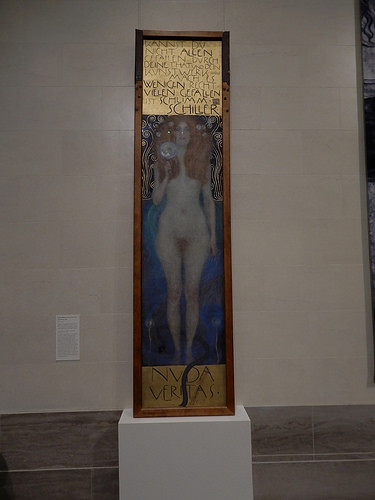
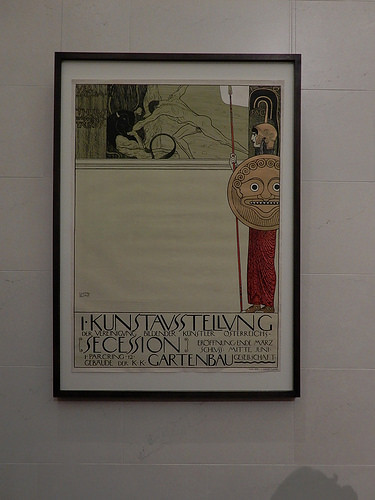 Nuda Veritas, 1899 (l) & Secession Exhibition Poster by Klimt (r)
Nuda Veritas, 1899 (l) & Secession Exhibition Poster by Klimt (r)
Klimt's
The Virgin and
The Baby were the epitomes of his most renown style — bold colors, monumental composition, sensual/disturbing themes, and intricately details. It was grateful to see these works.
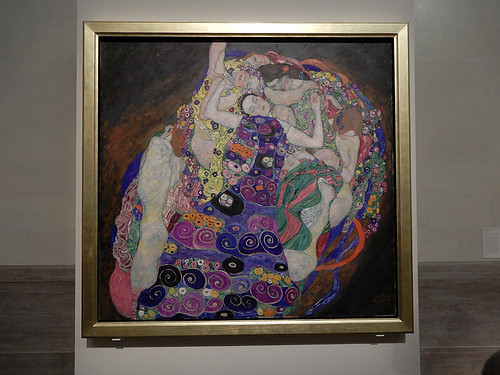 The Virgin, 1913
The Virgin, 1913
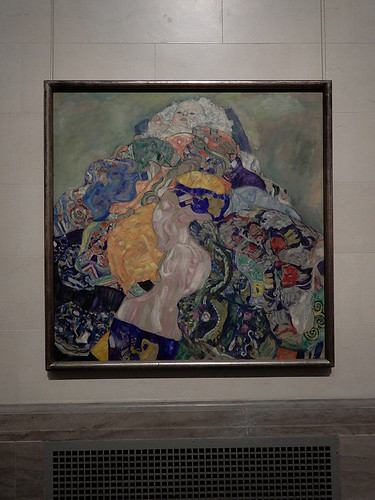 The Baby, 1917
The Baby, 1917
Following up was a Another glossy painting, whose over-polished style rendered it almost purely decorative.
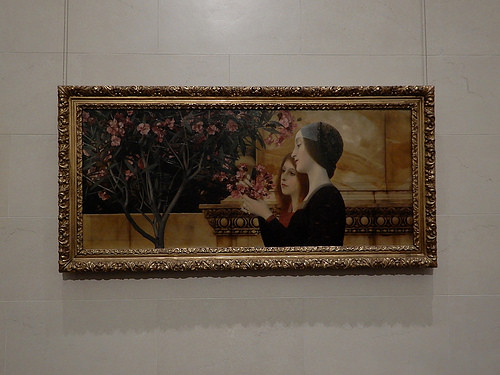
Moving to less familiar ground, and we saw several very interesting landscapes by Klimt, which resembled rather the works of his another contemporary, Egon Schiele, in the tightly intertwined patterns and somewhat twisted psyche.
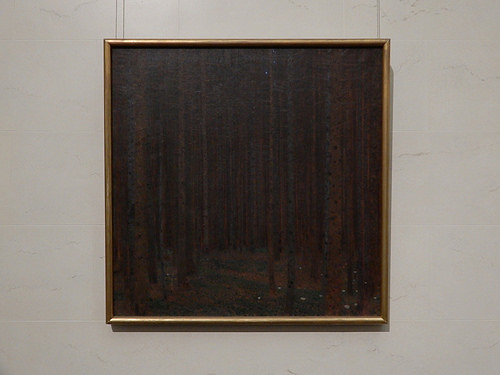 Pine Forest I, 1901
Pine Forest I, 1901
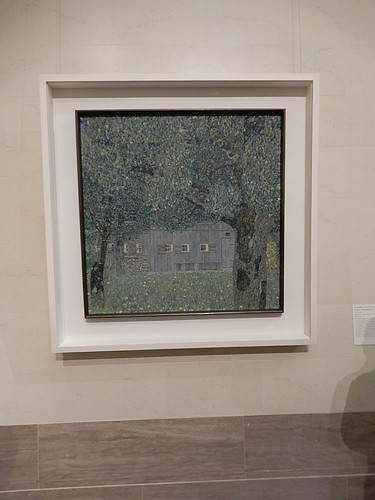
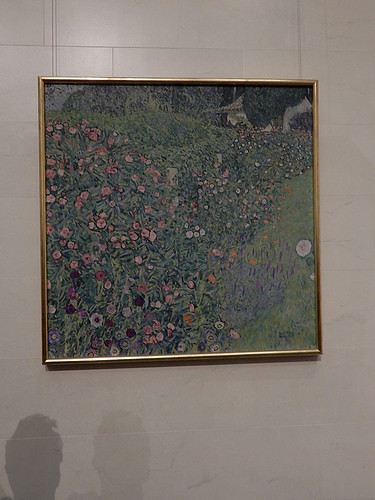 Farmhouse in Upper Austria, 1911(l) & A Garden in Italy, 1913 (r)
Farmhouse in Upper Austria, 1911(l) & A Garden in Italy, 1913 (r)
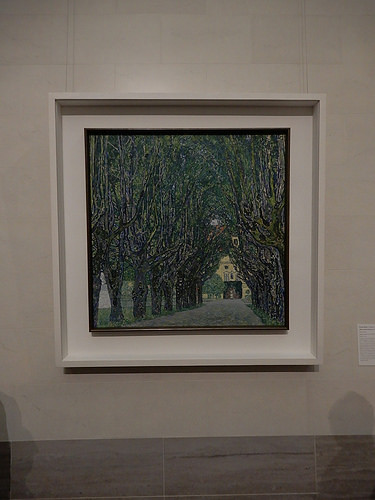 Allée at Schloss Kammer, 1912
Allée at Schloss Kammer, 1912
Several other portraits were also very interesting, either because they did challenged our impression of Klimt, or because the unfinished states of these works. Several pieces called French artist Henri de Toulouse-Lautrec to mind.
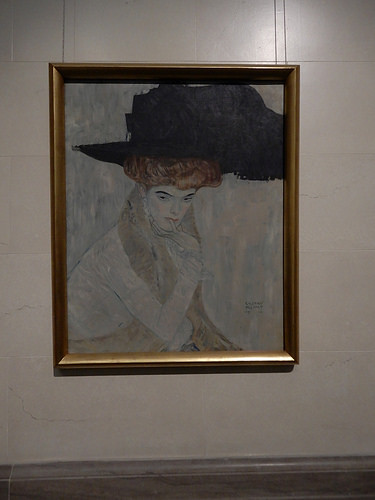 The Black-Feathered Hat, Klimt, 1910
The Black-Feathered Hat, Klimt, 1910
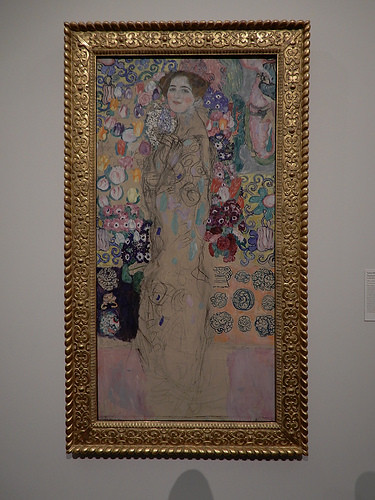
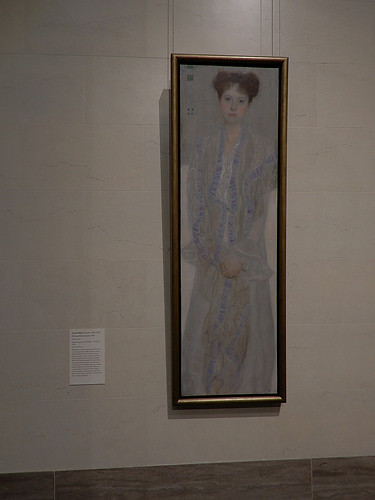 Portrait of Ria Munk III, 1917 (l) & Portrait of Gertrud Loew, 1902 (r)
Portrait of Ria Munk III, 1917 (l) & Portrait of Gertrud Loew, 1902 (r)
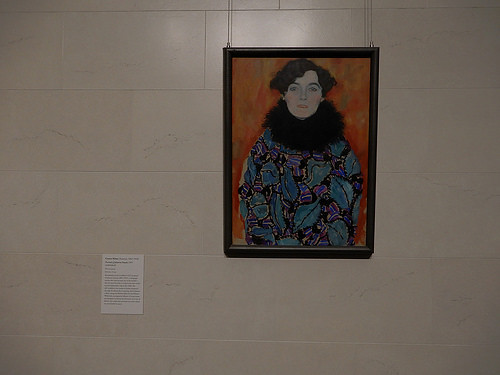 Portrait of Johanna Staude, 1917 (unfinished)
Portrait of Johanna Staude, 1917 (unfinished)
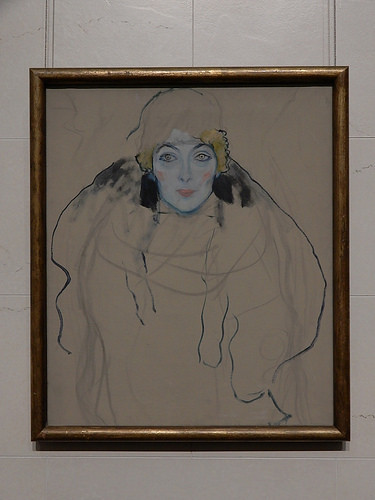 Portrait of a Lady, 1917 (unfinished)
Portrait of a Lady, 1917 (unfinished)
Finally, there was a pastel-hued portrait, recalling John Singer Sargent's rather manicured society ladies, and a nude study, whose economic lines were more eloquent than the elaborate dress of the society lady.
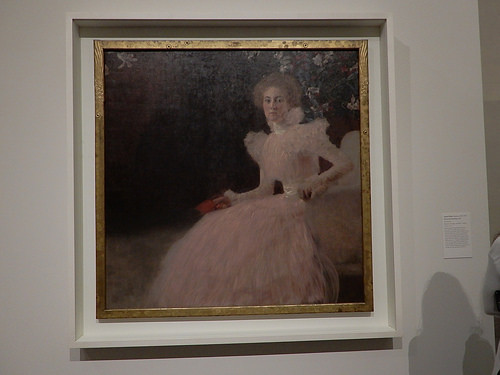 Portrait of Sonja Knips, 1898
Portrait of Sonja Knips, 1898
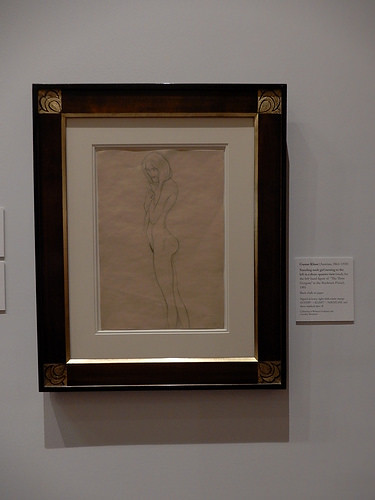 Standing nude girl turning to the left in a 3-quarter view, 1901
Standing nude girl turning to the left in a 3-quarter view, 1901
Though Rodin's works were generally more monumental in scale and topic, the deft mixture of certain sensuality and seriousness could be found in both Klimt and Rodin, and some arabesque poses in Rodin were not dissimilar to the intricate details of Klimt.
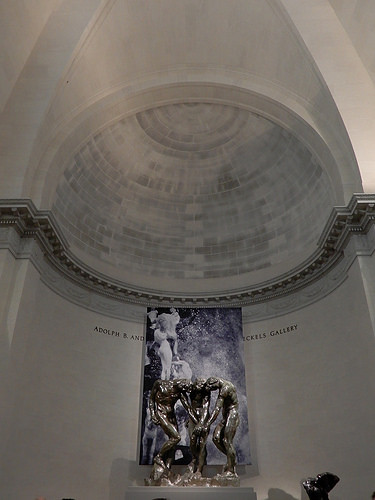 The Gates of Hell (Partial)
The Gates of Hell (Partial)
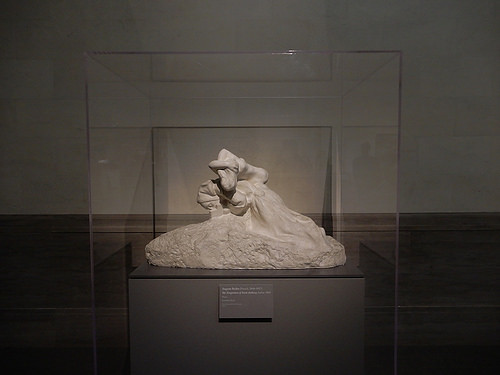 The Temptation of St Anthony, before 1900
The Temptation of St Anthony, before 1900
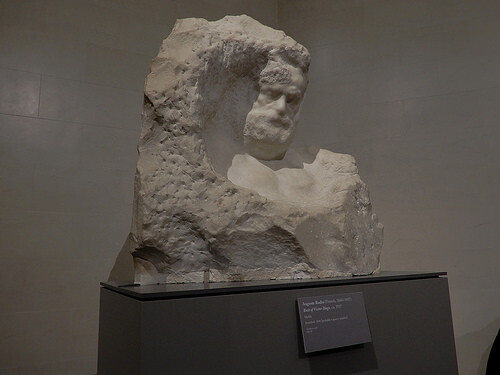 Bust of Victor Hugo, ca. 1917
Bust of Victor Hugo, ca. 1917
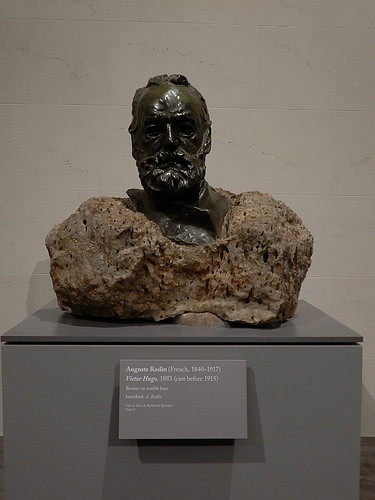 Victor Hugo, 1883
Victor Hugo, 1883
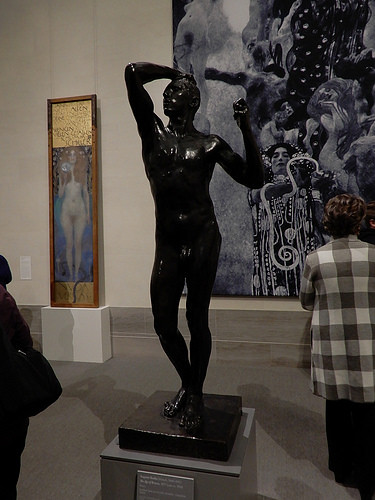 The Age of Bronze, ca. 1914
The Age of Bronze, ca. 1914
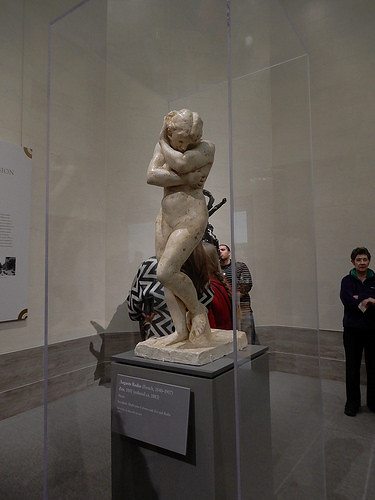 Eve, 1881
Eve, 1881
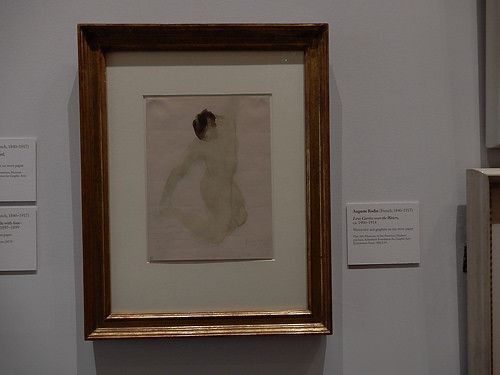 Love Carries over the Waters, ca. 1900-14
Love Carries over the Waters, ca. 1900-14
Other Related posts on
Art · 文化 · Kunst:
-
"Gods in Color" Exhibition at Legion of Honor Museum, San Francisco
-
Exhilarating Exhibition - Pierre Bonnard: Painting Arcadia at Legion of Honor Museum, San Francisco
-
My Favorite Paintings at Museum of Legion of Honor, San Francisco
-
Birth of Impressionism at De Young Museum, San Francisco
-
Van Gogh, Gauguin, Cézanne and Beyond: Post-Impressionist Masterpieces from the Musée d’Orsay at De Young Museum, San Francisco
-
Venetian Masterpieces from Vienna at De Young Museum
-
Post-Impressionism Masterpieces from the Musée d’Orsay, De Young Museum, San Francisco 2010-11
